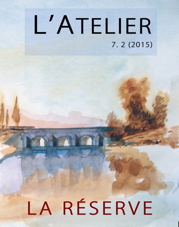'In some rare and sacred dead time...., there is a miracle of silence" On Not Lifting the Veil in McGregor's and Cusk's Novels
Mots-clés :
Littérature contemporaine, néo-modernisme, Lacan, Jacques.Résumé
The following paper will analyse how British writers McGregor and Cusk represent new forms of subjective crisis through disconnection, by laying the emphasis on that which constantly escapes language, that which cannot be said indeed. The characters fail to bond with each other, and readers are plunged into this disruptive communication thanks to a syntax that is marked by interruption and obsessive repetition (McGregor), or saturated with uncanny conceits (Cusk). These introspective, stylistic effects are in sharp contrast with the clichés that characters resort to in dialogues. If Nobody Speaks of Remarkable Things and Arlington Park focus on the plight of individuals lost in the seemingly ordered space of (sub)urban life, where they can find nobody to confide in. Their characters form a loose community (expressed in the disconnected narrative) whose common ground is the city they inhabit, or towards which they gravitate. Both novels open on a moment of pause, “a suspension of disbelief”, before the narrative probes into the characters’ subjective experience that is characterised by inhibition, which this paper will analyse as a form of reserve: a young woman finding it impossible to tell her mother that she is about to become a single mother; suburban, educated women on the verge of nervous breakdowns when they realise how patriarchal society has crushed their desires. Like Woolf whose character in The Voyage Out wanted to “write a novel about Silence… the things people don’t say”[1], Cusk and McGregor’s interest in silence lies in their knowledge that it is the trace of something else that remains unsaid, whether it is held back or impossible to articulate. Thereby, they show that there is no secured place for the subject in language (Lacan): this is how the cityscape comes to be read as an ironic backdrop. The characters’ lack of appropriation of space actualises the experience they have when trying to locate their being within language, as in the following example: “In that moment Amanda knew that her kitchen was too large. She would not have thought such a thing was possible, but entering it now she knew that it was true. They had knocked through until they had created not space but emptiness.” (AP 63-64) Both authors prolong Woolf’s work into the 21st century by working on creating characters out of voices and poetry out of the quotidian. In psychoanalytical terms, reserve is one of the signs of the subject’s inhibition, which is correlated to the impossibility for him/ her to grab the object of his / her desire (the object a in Lacan’s theory). Reserve in these novels can thus be analysed as the signifying effect of the presence of something that cannot be fully articulated, i.e. the wandering nature of the subject in language and its impossible localisation. Both novels emerge out of a menacing silence that is granted great, signifying power (placed as it is in the opening pages) and yet forces the characters to devise new ways of connecting with others. The paper will thus see how stylistic effects are signs of that which lies hidden behind the character’s reserve and why it is essential that it should remain undisclosed: language both reveals and covers the characters' ontological emptiness.[1] V. Woolf, The Voyage Out, 229, ch. 16.
Publiée
2016-01-11
Numéro
Rubrique
ARTICLES
Licence
-
L’envoi spontané d’un article à la rédaction de L’Atelier implique l’autorisation de publication et la cession des droits dans les limites établies par la loi de propriété intellectuelle.
-
L’Atelier conserve les droits de reproduction des articles publiés, quelque soit le support : internet, CD ROM, réimpression, photocopie, etc.
-
L’auteur conserve le droit de publier ultérieurement son article déjà paru dans L’Atelier avec la seule obligation de mentionner le nom de la revue comme source de la première publication.


